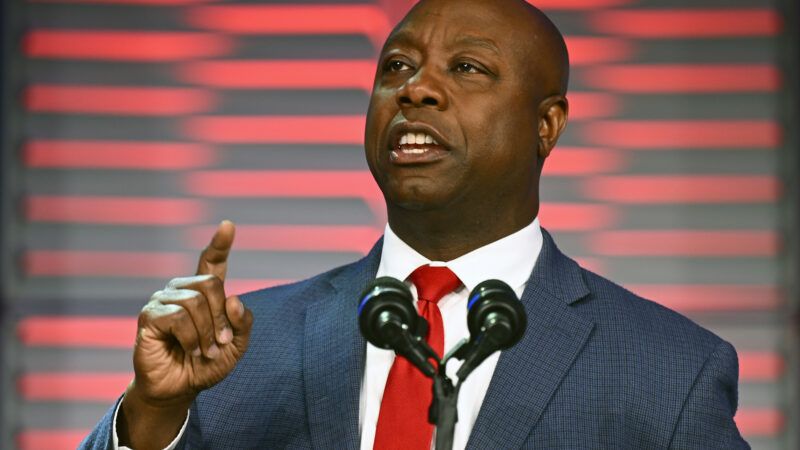Republicans Pivot to Bombing Iran in Third Debate
Sen. Tim Scott: "You actually have to cut off the head of the snake, and the head of the snake is Iran and not simply their proxies."

After two debates full of promises to bomb Mexico, the Republican presidential candidates turned their eyes toward a more traditional target for saber rattling: Iran.
Sen. Tim Scott (R–S.C.) staked out the most aggressive position against Iran, seemingly calling for direct American airstrikes against Iranian military units that have been involved in the recent strikes against U.S. forces in Iraq and Syria.
To stop the attacks on U.S. troops, "you've got to strike in Iran if you want to make a difference," Scott said. "You cannot just continue to have strikes in Syria on warehouses. You actually have to cut off the head of the snake, and the head of the snake is Iran and not simply their proxies."
"My foreign policy is simple," he concluded. "You cannot negotiate with evil, you have to destroy it."
In subsequent responses, other candidates—except for businessman Vivek Ramaswamy—were asked if they would support military action against Iran as well.
Former South Carolina Gov. Nikki Haley came the closest to joining Scott in calling for strikes. "This is Iran giving them the green light, telling them what to do," she said, referring to the various Middle Eastern militia groups with ties to Iran that have been behind the strikes on U.S. troops and several rocket attacks aimed at Israel.
"We need to go and take out the infrastructure that they are using to make those strikes so they can never do it again," she said. "You punch them once and you punch them hard, and they will back off."
Perhaps the most diplomatic response came from former New Jersey Gov. Chris Christie, who said he would "continue to isolate Iran so their only friends in the world are the…evil foursome of China, Russia, Iran, and North Korea," possibly invoking the infamous "Axis of Evil" from the George W. Bush presidency.
None of the candidates grappled with the most relevant question regarding the Iranian-backed militia strikes on American troops in Iraq and Syria: Why are American troops on the ground in Iraq and Syria in the first place? Surely, a better way to protect those American lives would be to remove them from a place where they are at risk—and where they might draw America into a broader war with Iran.
Florida Gov. Ron DeSantis got the closest to raising that point, though his answer was more than a bit muddled.
"I am not going to put our troops in harm's way unless you're willing to defend them with everything you have," he said, seemingly gesturing toward an argument for getting those troops out of harm's way in the first place. (Later, DeSantis would strike a stronger position in vowing not to send American troops to Ukraine—but followed that up with a vow to send troops to America's border with Mexico.)
Then, DeSantis pivoted to a more hawkish perspective. "I would say: 'you harm a hair on the head of an American service member and you are going to have hell to pay,'" he said. "We are not just going to sit there and let our service members be sitting ducks….We have to be strong, and we have to defend the people who defend us."
The leading candidate in the Republican field is, of course, former President Donald Trump, who was not part of Wednesday's debate. But while in office, Trump's foreign policy toward Iran was noteworthy for his relative restraint—so much so that notorious Iran hawk John Bolton fumed for years about how Trump thwarted his plans to start another Middle Eastern war.
It's a stretch to say that Trump's skepticism about America's foreign policy misadventures explains his lead in the polls. Still, other candidates looking to stand out in the Republican field ought to remember that GOP primary voters have favored foreign policy restraint, not dangerous threats to start new foreign wars.


Show Comments (77)